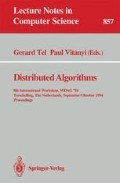Abstract
The paper considers the problem of implementing “Virtually Synchronous Communication” in the primary partition of an asynchronous system. Virtually Synchronous Communication was first introduced by the Isis system as a powerful mechanism for building fault-tolerant processes that mask failures by replication: it can be understood as a rule for ordering message deliveries (reliable multicasts) with respect to view changes, defined by a membership service. Primary partition Virtually Synchronous Communication, noted PP-VSC, is the problem of implementing Virtually Synchronous Communication in the case of totally ordered views. The paper formally defines the problem, and shows that surprisingly this problem is harder than consensus: (1) consensus is solvable whenever the PP-VSC problem is solvable, however (2) there are environments where consensus is solvable, but not PP-VSC. The paper also defines an environment in which PP-VSC can be solved. The practical consequences of the result are discussed.
Research supported by the “Fonds national suisse” and OFES under contract number 21-32210.91, as part of the ESPRIT Basic Research Project BROADCAST (number 6360), and by SPP-IP under contract number 5003–34344.
Preview
Unable to display preview. Download preview PDF.
References
Y. Amir, D. Dolev, S. Kramer, and D. Malki. Membership Algorithms for Multicast Communication Groups. In 6 th Intl. Workshop on Distributed Algorithms proceedings (WDAG-6), (LCNS, 647), pages 292–312, November 1992.
Y. Amir, L.E. Moser, P.M. Melliar-Smith, D.A. Agarwal, and P.Ciarfella. Fast Message Ordering and Membership Using a Logical Token-Passing Ring. In IEEE 13 th Intl. Conf. Distributed Computing Systems, pages 551–560, May 93.
K. Birman. The Process Group Approach to Reliable Distributed Computing. Comm. ACM, 36(l2):37–53, December 93.
K. Birman, A. Schiper, and P. Stephenson. Lightweight Causal and Atomic Group Multicast. ACM Trans. Comput. Syst., 9(3):272–314, August 1991.
T. D. Chandra, V. Hadzilacos, and S. Toueg. The Weakest Failure Detector for Solving Consensus. In proc. 11th annual ACM Symposium on Principles of Distributed Computing, pages 147–158, 1992.
Tushar D. Chandra and Sam Toueg. Unreliable failure detectors for reliable distributed systems. Technical Report 93-1374, Department of Computer Science, Cornell University, August 1993. A preliminary version appeared in the Proceedings of the Tenth ACM Symposium on Principles of Distributed Computing, pages 325–340. ACM Press, August 1991.
K. M. Chandy and L. Lamport. Distributed snapshots: determining global states of distributed systems. ACM Trans. Comp. Syst., 3(1):63–75, February 1985.
M. Fischer, N. Lynch, and M. Paterson. Impossibility of Distributed Consensus with One Faulty Process. J. ACM, 32:374–382, April 1985.
L. Lamport. Time, Clocks, and the Ordering of Events in a Distributed System. Comm. ACM, 21(7):558–565, July 78.
P. M. Melliar-Smith, L. E. Moser, and V. Agrawala. Membership Algorithms for Asynchronous Distributed Systems. In IEEE 11th Intl. Conf. Distributed Computing Systems, pages 480–488, May 91.
A. M. Ricciardi and K. P. Birman. Using Process Groups to Implement Failure Detection in Asynchronous Environments. In proc. annual ACM Symposium on Principles of Distributed Computing, pages 341–352, August 1991.
A. Schiper and A. Ricciardi. Virtually-Synchronous Communication Based on a Weak Failure Suspector. In IEEE 23rd Int Symp on Fault-Tolerant Computing (FTCS-23), pages 534–542, June 93.
A. Schiper and A. Sandoz. Uniform Reliable Multicast in a Virtually Synchronous Environment. In IEEE 13th Intl. Conf. Distributed Computing Systems, pages 561–568, May 93.
Author information
Authors and Affiliations
Editor information
Rights and permissions
Copyright information
© 1994 Springer-Verlag Berlin Heidelberg
About this paper
Cite this paper
Schiper, A., Sandoz, A. (1994). Primary partition “Virtually-synchronous communication” harder than consensus. In: Tel, G., Vitányi, P. (eds) Distributed Algorithms. WDAG 1994. Lecture Notes in Computer Science, vol 857. Springer, Berlin, Heidelberg. https://doi.org/10.1007/BFb0020423
Download citation
DOI: https://doi.org/10.1007/BFb0020423
Published:
Publisher Name: Springer, Berlin, Heidelberg
Print ISBN: 978-3-540-58449-0
Online ISBN: 978-3-540-48799-9
eBook Packages: Springer Book Archive

